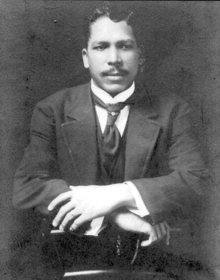Henry Morgan Green (1877–1939) was an American physician, a national healthcare leader,[1] researcher, scholar, real estate investor, and alderman.[2] He served as the city physician in Knoxville, Tennessee, and president of the National Medical Association.[3] He was one of the founders of Knoxville Medical College;[4] and is credited with expanding healthcare coverage for the Black community in Knoxville.[1]
Henry Morgan Green | |
|---|---|
 Green in 1910 | |
| Born | 1877 Adairsville, Georgia, U.S. |
| Died | March 19, 1939 |
| Other names | H. M. Green |
| Alma mater | Knoxville College, University of Michigan, Northwestern University |
| Occupations |
|
| Spouse | Henri Henderson |
| Children | 2 |
Early life and education
editHenry Morgan Green was born in 1877 in Adairsville, Georgia.[3][5] Green studied at the Normal School at Knoxville College, where he graduated (1895).[3][6]
After a year of teaching in Riceville, Tennessee, he returned a year later to Knoxville College to attend the college's newly established medical department.[7][6] Green continued studies at the University of Michigan, and Northwestern University.[when?][3]
Career
editHe had an early medical practice in Jellico, Tennessee.[8] For 17 years he served as the city physician in Knoxville, Tennessee; and worked as a doctor in Knoxville from 1900 to 1939.[3][4] Green was one of the founders of Knoxville Medical College (1900–1910).[4][9]
In 1900, Green became an alderman (or council member) in order to represent his neighborhood in the fifth ward, he was the first Black alderman in the city.[2] He remained an alderman until 1912, and it took another 62 years before the Knoxville city council had another Black alderman.[10][11][12] In 1910 and 1911, Green served as the chairman of the "Colored Department" at the Appalachian Exposition, held in Knoxville.[13]
He served as president of the National Medical Association, elected in 1922;[7][14] and was the founding president of the National Hospital Association in 1923.[3][4]
In 1922, Green married school teacher Henri Henderson; and together they had two children.[3][8]
Death and legacy
editHe died of pneumonia on March 19, 1939, in Knoxville.[8] He is buried on the campus of Knoxville College, in the Freedmen's Mission Historic Cemetery (formerly known as the Fourth United Presbyterian Church Cemetery).[15]
The Green School (sometimes refer to as the "Colored High School" in the early years) in Knoxville was named for him, and opened in 1909.[5][16] Green was profiled in the book, The Knoxville Negro: Emphasizing the Great Era of Progress Prevalent in Negro Knoxville Today (1929) by Bartow G. Wilson.[17]
See also
editReferences
edit- ^ a b "Black historian, Joe Valentine, shows the impact Black figures from Knoxville made throughout history". WBIR. February 11, 2021. Retrieved 2023-04-08.
- ^ a b "Hard Problems for New City Officials". Knoxville Sentinel. 1908-01-25. p. 13. Retrieved 2023-04-08.
- ^ a b c d e f g Wilson, Bartow G. (June 1929). The Knoxville Negro: Emphasizing the Great Era of Progress Prevalent in Negro Knoxville Today. pp. 19–20. Retrieved 2023-04-07 – via Calvin M. McClung Historical Collection.
- ^ a b c d "Dr. Henry Morgan Green". James E. Walker Library, Middle Tennessee State University.
- ^ a b Zimmerman, Elena Irish (1998-06-01). Knoxville, Tennessee. Arcadia Publishing. p. 127. ISBN 978-0-7385-8987-9.
- ^ a b "Knoxville College had white grads in early days". The Knoxville News-Sentinel. 2016-12-27. p. 15. Retrieved 2023-04-08.
- ^ a b Booker, Robert (2012-02-14). "City boasts long roll of black achievers". The Knoxville News-Sentinel. p. 13. Retrieved 2023-04-08.
- ^ a b c "Illness Ends Long Career of Service by Dr Green". The Knoxville News-Sentinel. 1939-03-20. p. 10. Retrieved 2023-04-08.
- ^ Watson, Wilbur (2017-12-02). Against the Odds: Blacks in the Profession of Medicine in the United States. Routledge. pp. 29–30. ISBN 978-1-351-53334-8.
- ^ "Black Knoxvillians elected Dr. Presnell as 'Bronze Mayor'". The Knoxville News-Sentinel. 2022-10-16. pp. E2. Retrieved 2023-04-08.
- ^ "The History of Black City Council Members". The Knoxville News-Sentinel. 2017-10-30. p. 11. Retrieved 2023-04-08.
- ^ "A Century Born". The Knoxville News-Sentinel. 2012-01-29. pp. S2 – S3, S4. Retrieved 2023-04-08.
- ^ "Colored Department, Exponent of Progress of Negros". Knoxville Sentinel. 1910-09-06. p. 36. Retrieved 2023-04-08.
- ^ Williams, Richard Allen (2020). Blacks in Medicine: Clinical, Demographic, and Socioeconomic Correlations. Springer Nature. pp. 98–99. ISBN 9783030419608.
- ^ "Honoring burial site". The Knoxville News-Sentinel. 2009-09-29. p. 1. Retrieved 2023-04-08.
- ^ "Schools didn't teach about black leaders". The Knoxville News-Sentinel. 2017-01-24. p. 15. Retrieved 2023-04-08.
- ^ Booker, Robert (2007-01-23). "Book named prominent blacks". The Knoxville News-Sentinel. p. 11. Retrieved 2023-04-08.